This week, Heather and I had a Skype meeting with two missionaries from Menomonie, WI. We had never met before, so we took the time get to know one another, talk about our respective ministries, and pray for each other. Before praying, they asked me, "what are some of your needs that we can be praying for at this time?"
It's not an uncommon question, and it certainly wasn't unexpected, but it's been rattling around in my heart ever since.
There are a lot of visible needs at the Shelter during this pandemic. There's the need for health and safety. The need for hand sanitizer and personal protective equipment. There's the need for food, clean water, school curriculum, clothing, and medicine. For those of us going around town, there's the need for documentation and preparation to ensure safe passage through checkpoints. By the grace of God, through the generosity of our supporters, all these things have been provided. The children can play games, enjoy full meals, and receive all the love, support, and care that we can muster.
Then there are those needs that aren't as visible. There's the need for strength and calm; for endurance, patience, diligence, and faithfulness. There's the need for friendships and encouragement. There's the need for prayer and time spent with the One who ultimately provides for all our needs. Thank you for praying with us. I can tell you firsthand that they are being felt as we navigate this pandemic together.
There is a need I fear may go unnoticed, forgotten, or neglected by the world at large ...
But the one need that's been rattling around in my heart is one that I fear may go unnoticed, forgotten, or neglected by the world at large. This pandemic has strained governments and the systems that we have in place to help the vulnerable; to help the widow and the orphan—to help the least of these (Matt 25:40). Since the start of this pandemic, we have not had any children placed with adoptive families, and only a handful of our children have been presented for regional, national, or international matching (that is to say, the processes that governments use to match children with prospective adoptive families, both locally and internationally, has been severely hindered due to the coronavirus pandemic). What makes this reality even more difficult to face is the fact that quite a few of our children will be aging out of adoption in the coming months; meaning, they will reach an age where adoption is no longer allowed.
This is a video of an extremely long line that formed in Guadalupe, Cebu City when the local government announced it would be disbursing aid to impoverished families during the quarantine. The Department of Social Welfare and Development (DSWD), which we work with for referrals and placements, is also tasked with handing out this aid.
We knew this day could potentially come for our older children, and we've been doing our best to prepare all our kids for whatever life has in store for them, including independent adult life in the Philippines. We will prayerfully continue to do so, hoping to launch our older children into a healthy and beautiful adulthood.
But I would like to ask all of you to please take some extra time to pray. Pray for these kids who will be aging out in the coming months. Pray that they will be able to cope emotionally, and pray that all of us at CSC are able to provide them with the love and support that they need to be launched into a beautiful future without an adoptive family.
And pray for a miracle. Some of our kids have less than a few months before aging out. Pray that domestic and international government agencies will be able to process the needed paperwork, and that the right families will be searching at just the right time. Thank you for praying with us.
Who is the teacher?
Teacher Kristen is new to the CCHS team and we are so glad she is with us. Read on to find out what lesson she learned in her first few weeks on the job.
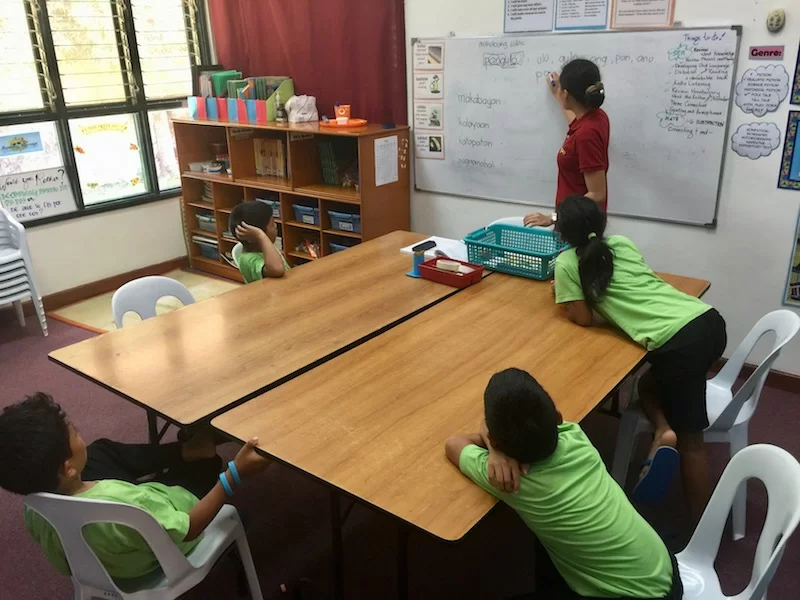
This is my first year ever teaching and I am so glad to be at Cebu Children of Hope School! The things they taught me in college have prepared me for the classroom, but only to a certain point. I've been struggling a bit with new routines and new students. I have tried many of the strategies I learned in college to help students focus in class but they haven't helped much.
I remember when I was a student like them. School was tiring for me as I had to sit most of the day and just listen to the teacher. Not very fun. When I started teaching this year I realized I was doing the same thing my past teachers did, things that made me, as a student, bored. In the first few weeks of school my students at CCHS taught me that I was too idealistic when it came to teaching. They taught me that I needed to cool down and start embracing their unique qualities.
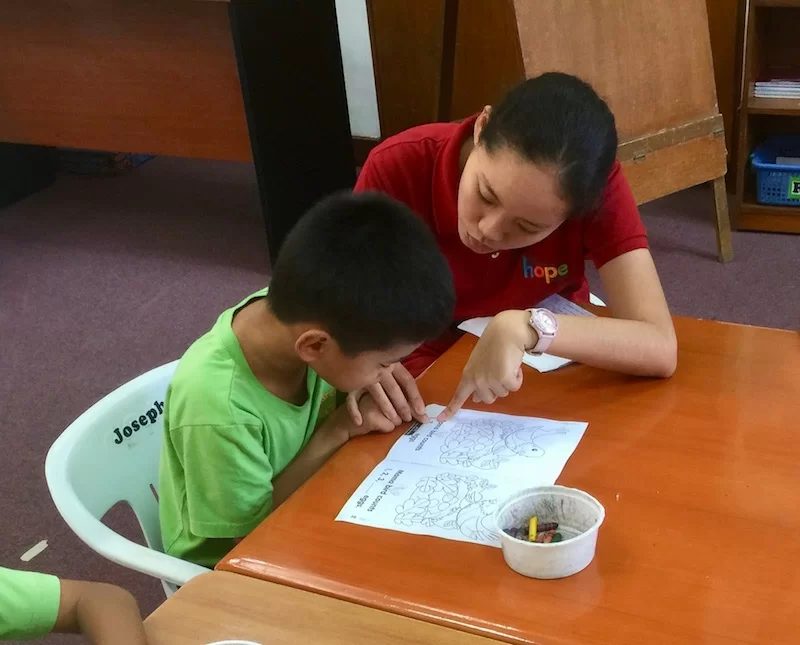
Once I realized this I made some changes in my classroom. I started to really listen to them and smile more. Very quickly I saw changes in their behavior. Now I am having fun teaching them and I love how they respond in class- showing excitement to learn!
Teachers are supposed to be the ones to teach kids. At CCHS I have learned that often kids can be great teachers.
Preschoolers and Plants
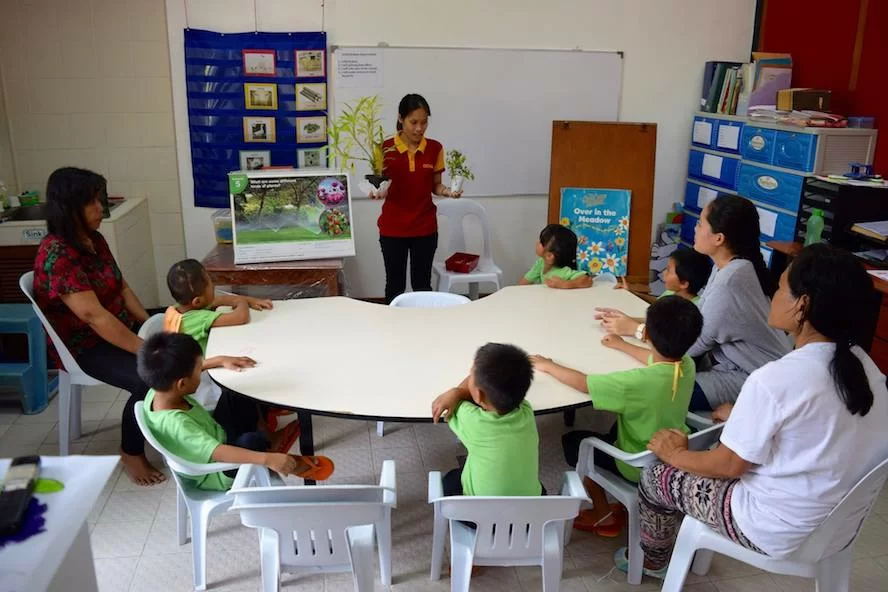
The preschoolers have been learning about the difference between living things and nonliving things. One example of a living thing, which we have been studying a lot about, is a plant. Every time I review with the children they say, "Sige ug balik" (It's a repeat). By the end of the unit the preschoolers were able to identify a plant, tree, shrub, vegetable, and grass. They also learned the parts of the plant (stem, flower, fruit, and roots) and where plants live (in desserts, farms, forests, and gardens).
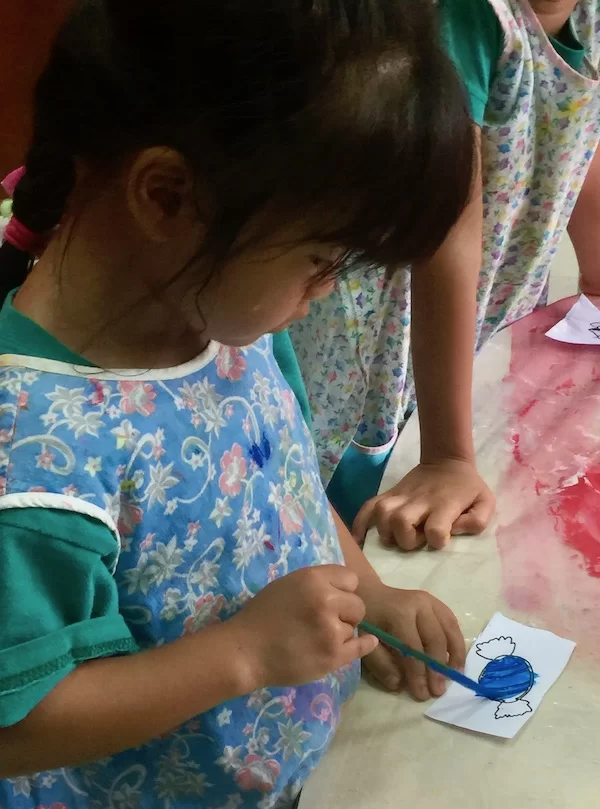 One of my favorite parts of the unit was taking the preschoolers outside for a mini field trip. Our school is surrounded by many different kinds of plants. On our "living things walk" we saw many banana trees, mango trees, and even an avocado tree. The preschoolers loved searching for living things and telling us what they found.
One of my favorite parts of the unit was taking the preschoolers outside for a mini field trip. Our school is surrounded by many different kinds of plants. On our "living things walk" we saw many banana trees, mango trees, and even an avocado tree. The preschoolers loved searching for living things and telling us what they found.
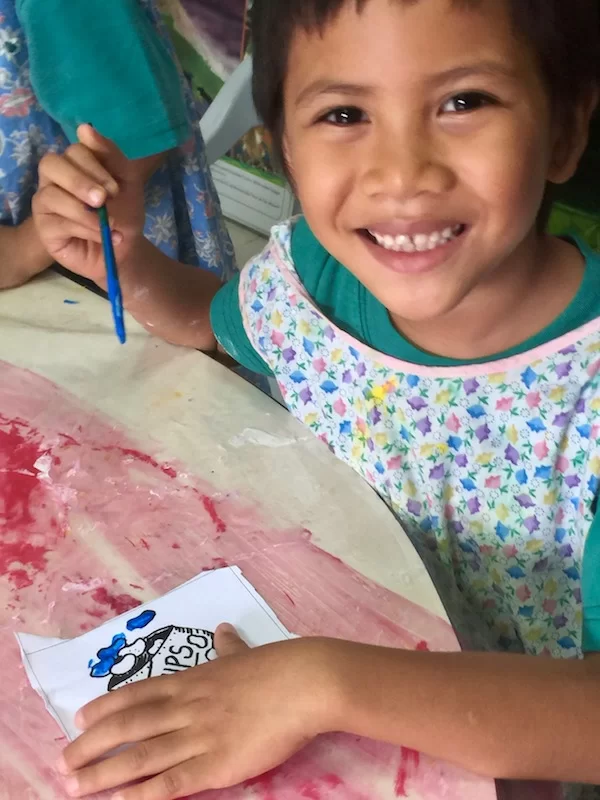
What a joy it was teaching the preschoolers about plants. We had a fun time learning together!
Creative Minds
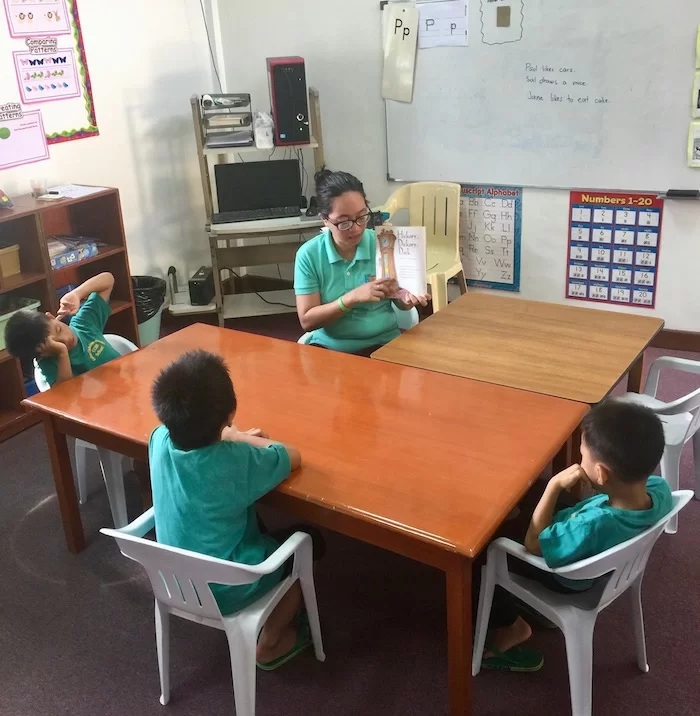
Having conversations with my students helps them learn to interact with their peers and teachers. It has a great impact on their learning and ability to listen as well.
I started this year with just three kids in my classroom. Three kids who love conversation and enjoy sharing their thoughts. One afternoon, during Civics class, one of my students shared with me about one of the CSC aunties (child care workers).
Student 1: Teacher, our auntie just had a baby! (saying it excitedly)
Me: Wow, that's great! Do you know if the baby is a boy or a girl?
Student 1: I don't know.
Student 2: Teacher, I know where the baby comes out.
Me: Where?
Student 2: Here! (referring to his bottom)
Student 1: No Teacher! I heard that a baby comes out from your belly button.
Student 3: Teacher, I know where babies come out of, here in our back.
Student 1: (reacting with a shocked face) No, the baby can't come out of there!
Me: Why?
Student 1: Because our back has a lot of bones. The baby will get hurt!
I love teaching at Cebu Children of Hope School for many reasons. One of them is the creative minds these little children have. You never know what ideas they will share.
Goodbye Up There!
Child welfare types refer to children who become very close while in care at a place like CSC as "institutional siblings." They are not siblings by blood but by affinity. Many of our children experience that kind of relationship while living at CSC. For the younger ones, they don't understand the difference. Such was the case with little Jacob. He had four very good buddies in the Eicher Home nursery. They spent lots of time together eating and playing. They looked out for each other, fought like true siblings and were known to tattle on each other on occasion.
Recently, Jacob was adopted by a great family from Europe. Shortly before Jacob's family came to get him, two of his pals got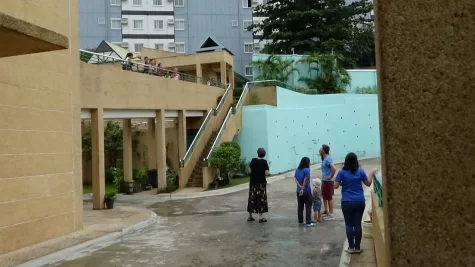 sick and had to be in isolation. Their ailment was very contagious. We worried that Jake, too, would get sick when he was supposed to travel but, thankfully, that didn't happen. But we felt bad that Jake wouldn't be able to say goodbye to his buddies. So Marlys came up with a plan. The infirmary caregivers brought the sick children outside to the bridge and Jake was able to look up, see them and say goodbye. The overhead kids shouted "bye-bye" and it was very touching. Certainly they didn't understand that he was going far away and they might never see him again. But they knew something big was up.
sick and had to be in isolation. Their ailment was very contagious. We worried that Jake, too, would get sick when he was supposed to travel but, thankfully, that didn't happen. But we felt bad that Jake wouldn't be able to say goodbye to his buddies. So Marlys came up with a plan. The infirmary caregivers brought the sick children outside to the bridge and Jake was able to look up, see them and say goodbye. The overhead kids shouted "bye-bye" and it was very touching. Certainly they didn't understand that he was going far away and they might never see him again. But they knew something big was up.
There is lots of love at CSC. Jacob experienced that from house parents, child care workers, staff and the other children. Now he will be feeling the love of a family. And a new sibling that will be his forever.
Science Can Be Funny
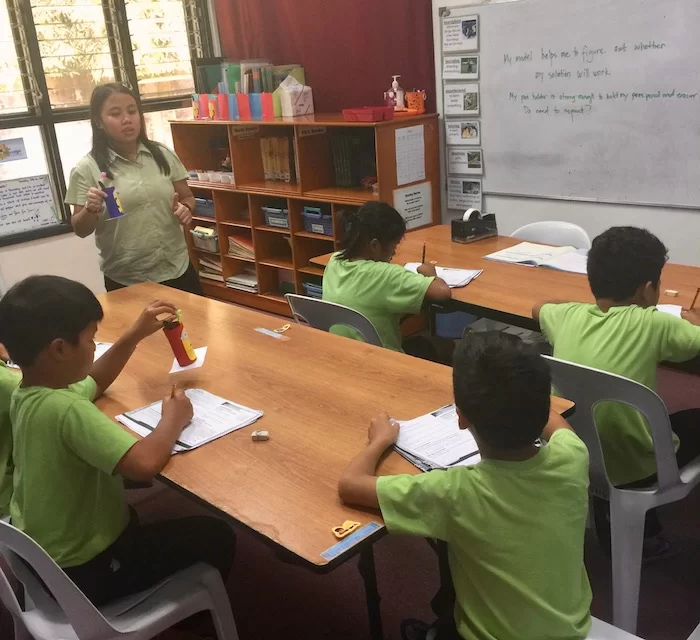
The official school year has begun at CSC! Teacher Lyrah, one of our dedicated and gifted teachers, shared about a science lesson she taught the other day:
Everyone was ready and calm as I stepped into the classroom. The students seemed very excited for the afternoon's discussion entitled "The Scientist and the Science tools."
I asked my students about the science tools and the brainstorming happened like this:
TEACHER: Can you still remember some of the science tools that you learned about last year in your class?
STUDENTS: Yes, Teacher Lyrah!
TEACHER: Tell me about one of those science tools.
STUDENT 1: Teacher, a hand lens.
STUDENT 2: How about a balance?
STUDENT 3: A measuring cup.
STUDENT 4: Thermometer!
TEACHER: WOW! You are really thinking about these tools. What are some others?
I called on one student who hadn't answered yet.
TEACHER: Okay, what is it?
He was very hesitant about his tool and just smiled again.
STUDENT 5: Teacher, how about a telecopter?
He was laughing so hard because he mentioned the tool in a different way. Everyone in the class was puzzled about his answer.
STUDENT 1: What do you mean a telecopter?
Student 5 laughed so hard and kept on saying the word telecopter.
STUDENT 5: (laughing) Teacher, what I mean is a telescope not a telecopter!
TEACHER: A telecopter? That word is a combination of a telescope and a helicopter. Isn't it?
He laughed and said: " Yes, teacher because we use a telescope to see the stars and other flying objects like helicopters."
Then I remembered the time last year when I showed them a telescope and we talked about how it worked.
Everyone in the classroom was amazed with his great new word invention!






